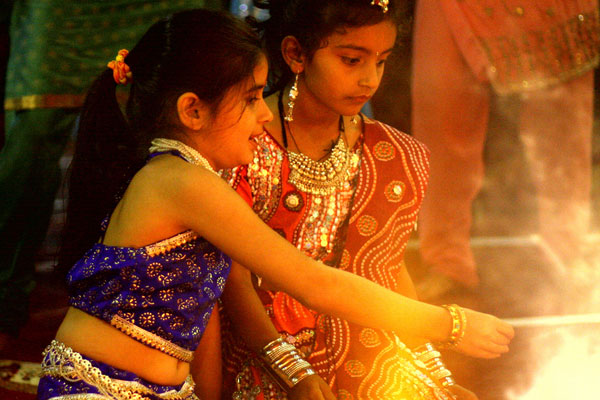 Literally translated as “nine nights” from the original Sanskrit, Sharad Navratri is a huge Hindu celebration that is dedicated to the goddess Durga. She is the goddess of purity, and the festival goes on for nine days and nine nights. Because the lunar calendar is followed by Hindus, and Sharad Navratri is celebrated on slightly different days each year. In 2014 it is being celebrated from September 25th to October 3. Each day has special traditions and rituals that will differ depending on where you are in the world, but they all hold the common theme: celebration of purity and goodness.
Literally translated as “nine nights” from the original Sanskrit, Sharad Navratri is a huge Hindu celebration that is dedicated to the goddess Durga. She is the goddess of purity, and the festival goes on for nine days and nine nights. Because the lunar calendar is followed by Hindus, and Sharad Navratri is celebrated on slightly different days each year. In 2014 it is being celebrated from September 25th to October 3. Each day has special traditions and rituals that will differ depending on where you are in the world, but they all hold the common theme: celebration of purity and goodness.
Throughout history, Sharad Navratri has been celebrated through ritual fasting, as well as huge celebrations. Many people will chant mantras or bhajans throughout the nine days, and visit the shrines of many goddesses that represent a part of Durga, such as Lakshmi and Saraswati. There are special traditional dances that are performed during Sharad Navratri, including the Garba. Performed by both men and women with thin wooden sticks, it is a dance that commemorates the story of Lord Krishna in singing and dancing. Sharad Navratri is usually divided into three sections of three days each: in the first section, people pray to Durga to remove all of their impurities; in the second, people pray to Lakshmi as the giver of wealth and goodness; and in the last three days, the mother of wisdom, Saraswati, is worshipped.
Many people in India will travel to a large temple or a big city to join in the festival that is being held there. Some people chose to go on pilgrimage during this time as it is seen as a time of purity and pure intentions. However, the celebrations for Sharad Navratri vary greatly in different parts of India. The Garba dance, mentioned above, is most commonly performed in western parts of India. In southern India many people will perform ayudha puja for their vehicles and appliances during Sharad Navratri, which is a ritual blessing of something, and giving of thanks. In the North, celebrants will burn effigies of the evil king Ravana as they celebrate his defeat at the hands of Lord Rama.





